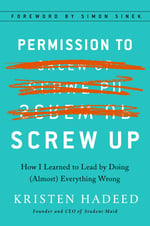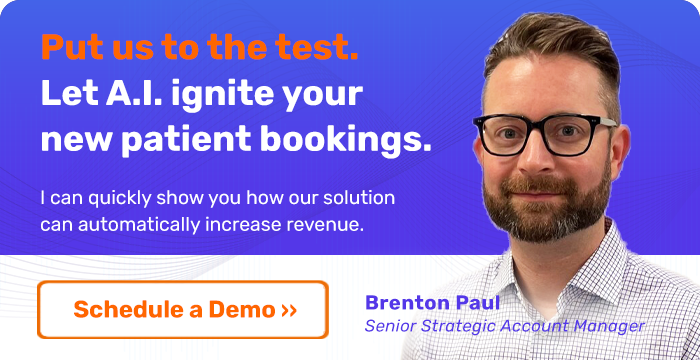May 2020--Kristen Hadeed learned leadership lessons early in her entrepreneurial journey – and she learned them the hard way. Not long after landing a big contract for her new cleaning business, Student Maid, 45 of her 60 employees suddenly quit.
“At that point,” she said, “I was clueless when it came to leadership.”
She knew enough to understand that her company’s future depended on what she did next. How did she salvage the situation and set Student Maid on a course for success?
“By admitting I didn't know what I was doing, asking for their help, painting a picture of what it meant if I didn't get these apartments cleaned and how that was really going to affect the business financially,” Hadeed told Patient Prism CEO Amal Nirgudkar. “And I think people just saw me as a human being, and they really wanted to help me. And that really taught me that the best thing you can do when you're unsure is just say it out loud. You know, people respect that. That's how you build trust.”
 That early epiphany helped shape her leadership philosophy and, in 2017, led to the publication of her first book, Permission to Screw Up. When the COVID-19 crisis struck, it put her hard-earned personal lessons to the ultimate test.
That early epiphany helped shape her leadership philosophy and, in 2017, led to the publication of her first book, Permission to Screw Up. When the COVID-19 crisis struck, it put her hard-earned personal lessons to the ultimate test.
In a wide-ranging conversation about leadership with Patient Prism, Hadeed explained how she has positioned Student Maid to weather the coronavirus storm. Her re-interpretation of the concept of strong leadership provides a valuable guide for dentists, DSO leaders, and other entrepreneurs trying to hold on through the pandemic.
“I think what we're experiencing right now is the greatest test of leadership, of culture, of business,” she said. “It is beyond challenging. And I think in terms of (the) question, how do we navigate uncertainty? We have to talk about fear.”
Leading Through Crisis: Embrace the Fear
One of Hadeed’s guiding principles as a leader is to turn the concept of “strong” on its head.
“Traditionally, we think that strong leadership is having the answers, being confident, knowing what the next chapter is going to look like,” she said. “Being optimistic, being able to paint a vision. I'm sure if you’re like me, you're feeling like, ‘How can I paint a vision when I don't even know what the next chapter is going to look like?’
“I would challenge us to redefine what strong leadership is right now.”
For Hadeed, being strong means expressing fears openly and being vulnerable through honesty.
“The first step, I believe, is acknowledging the fears that we have, not keeping them to ourselves, not shaming ourselves for having these thoughts,” she said. “It's OK to be frustrated, scared, uncertain. It's OK to grieve what was before this all began.”
Once the fears have been acknowledged, Hadeed said, it’s time to dive even deeper into uncertainty by allowing yourself to consider the worst-case scenario. Until the worst case has been imagined, there is no way to truly accomplish the final step – moving on.
“I think it’s good to plan for the worst case,” she said, “because once you do that, sometimes it’s enough to mitigate the fear.”
Imagine the Worst-Case Scenario
She put the idea into practice when it became evident in early March that her cleaning business would need to shut down for a while to ensure the safety of her employees. It wasn’t an easy conversation, she said, but the effort she put into building trust with her team paid off.
“I had a fear that what if we never cleaned a house again? What if no one ever wants to let us into their home again?” Hadeed said. “And so, I posed that question to the team: what if this scenario of we're never able to be at another house again comes true, what do we do?”
In asking the question, answers began to materialize. In finding answers, the fear began to give way to the energy required to take practical action.
“And that's the most important step moving forward,” she said.
After consulting with her employees and leadership team, Hadeed initially decided to close down for two weeks. The shutdown stretched to a month, but a Paycheck Protection Program loan from the federal government helped ensure Student Maid’s employees would be paid into early summer.
With payroll worries settled for the time being, Hadeed was able to plan for re-opening her business. She again consulted her team and came up with a plan that included new safety procedures and equipment, and emphasized individual safety and security.
“I think what happens is sometimes fear drives decisions, fear around the financial side of this,” she said. “So, what I worry about are the people who really don't feel safe working, but they need the paycheck. So, they show up at work even though they're terrified to be there.
“And do you think if they're terrified to be there, they're actually going to be the best at work and be the best for our customers? Probably not. So we've tried to eliminate that from the equation.”
Learning Lessons from Hardship
Hadeed urges patience and introspection during the down time for company leaders trying to find the way forward. She recommends regular communication to check in on how team members are feeling.
She also recommends using this time to build resilience.
“Resilience is a muscle that we have to learn to use regularly in order to be resilient leaders,” she said. “Resilient teams and resiliency is about knowing that yes, it's hard right now, but there will be a day – and it's not today and it's not tomorrow and it's not next week or month or maybe even not this year – but there'll be a day where we look back and we look at this time that we're in now and we see the good that came out of it and we see the lessons we learned.”
It won’t be easy, Hadeed admits. But times like these are when competent, compassionate, empathetic leaders are most valuable.
“I don't want to discount that what we're experiencing right now is horrible and there's so much devastation and people are losing their lives and there is nothing that will make that feel better,” she said. “That's horrible, right? But it's also possible that in times like these that there's good that comes out of it and there are opportunities and there are lessons learned. And so how can we frame what we're going through with that lens and redefine what success is? You know, success right now, I think, is about taking care of our people.
“It's about strengthening our culture, our trust. And it's about learning how to be more resilient, because there will always be challenges. And they won't look like this, but it's how we respond to those challenges that will determine our success.”
Additional Resources
Click here to subscribe to Kristen Hadeed's blog.
Guide: Staying Safe in the Dental Practice: Guidance on everything from what the CDC recommends to how to acquire PPE to whether you should pass along the cost to patients.
Guide: Comeback Strategies for Dental Practices
For more interviews with experts, training resources, and guides, visit Academy.PatientPrism.com.
There will be a huge need for dentistry once people can resume normal activities. More people than ever will have questions about safety, affordable treatment options, and what’s covered by their insurance plans post-COVID. Visit www.patientprism.com/product-overview to find out how we can help your team convert more callers into booked appointments.
Subscribe to our blog for the latest updates
By submitting this form you will be receiving our latest updates on post. We're committed to your privacy. Patient Prism uses the information you provide to us to contact you about our relevant content, products, and services. You may unsubscribe from these communications at any time.
- Recent
- Popular











